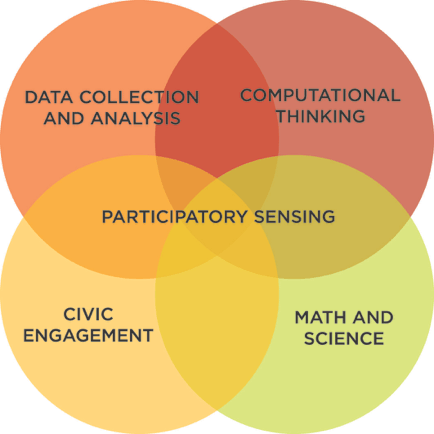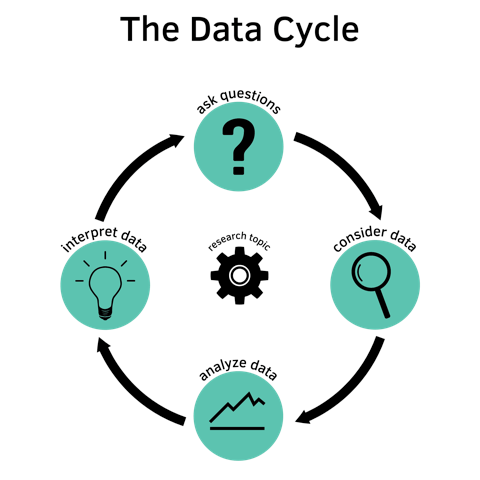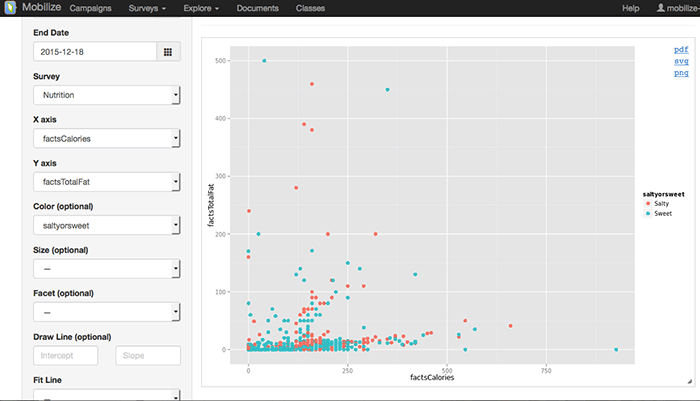Mobilize centers its curricula around participatory sensing campaigns in which students use their mobile devices to collect and share data about their communities and their lives, and to analyze these data to gain a greater understanding about their world.
 Mobilize breaks barriers by teaching students to apply concepts and practices from computer science and statistics in order to learn science and mathematics. Mobilize is dynamic: each class collects its own data, and each class has the opportunity to make unique discoveries. We use mobile devices not as gimmicks to capture students’ attention, but as legitimate tools that bring scientific enquiry into our everyday lives.
Mobilize breaks barriers by teaching students to apply concepts and practices from computer science and statistics in order to learn science and mathematics. Mobilize is dynamic: each class collects its own data, and each class has the opportunity to make unique discoveries. We use mobile devices not as gimmicks to capture students’ attention, but as legitimate tools that bring scientific enquiry into our everyday lives.
Mobilize comprises four key curricula: Introduction to Data Science (IDS), Algebra I, Biology, and Mobilize Prime, all focused on preparing students to live in a data-driven world. The Mobilize curricula are a unique blend of computational and statistical thinking subject matter content that teaches students to think critically about and with data. The Mobilize curricula utilize innovative mobile technology to enhance math and science classroom learning. Mobilize brings “Big Data” into the classroom in the form of participatory sensing, a hands-on method in which students use mobile devices to collect data about their lives and community, then use Mobilize Visualization tools to analyze and interpret the data.
 With a focus on modeling, inquiry, and problem-solving, the Mobilize curricula serve as a bridge for LAUSD math and science teachers transitioning to Common Core State Standards for Math (CCSS) and the Next Generation Science Standards (NGSS). In particular, Mobilize curricula engage students in data cycle investigations (i.e., asking research questions; collecting, analyzing and interpreting data), a key area of emphasis for CCSS, NGSS, and Smarter Balance.
With a focus on modeling, inquiry, and problem-solving, the Mobilize curricula serve as a bridge for LAUSD math and science teachers transitioning to Common Core State Standards for Math (CCSS) and the Next Generation Science Standards (NGSS). In particular, Mobilize curricula engage students in data cycle investigations (i.e., asking research questions; collecting, analyzing and interpreting data), a key area of emphasis for CCSS, NGSS, and Smarter Balance.

The Mobilize Algebra course consists of three, 7-11-day units that cover fundamental statistics, linearity, quantitative literacy, and proportional reasoning. The curriculum is designed to leverage students’ engagement with real data to develop understanding of the Common Core State Standards (CCSS) and Mathematical Practices for Algebra. More specifically, the course develops students’ strengths in the following key CCSS concepts:
- Number and Quantity Quantities (N-Q):
- Algebra – Seeing Structure in Expressions (A-SSE):
- Algebra – Creating Equations★ (A-CED):
- Interpreting Functions (F-IF)
- Building Functions (F-BF)
- Interpreting Categorical and Quantitative Data (S-ID)

Students find linear patterns through analysis of data they’ve collected about their own nutritional habits.

The Mobilize Biology curriculum uses Participatory Sensing to tie students’ understanding of resources utilization, consumption, and population dynamics together, all within the context of their own trash. Through data collection, data analysis, and ecological principles, students connect their experiences together to identify patterns within their community and design solutions to the challenges of solid waste in our environment.
This 4-week module is designed to support students in building an understanding of human activity and the impact it has upon the environment. This interdisciplinary unit explicitly supports the following Next Generation Science Standards (NGSS), with a clear focus on the following standards:
HS-LS2-6: Evaluate the claims, evidence, and reasoning that the complex interactions in ecosystems maintain relatively consistent numbers and types of organisms in stable conditions, but changing conditions may result in a new ecosystem.
HS-LS2-7: Design, evaluate, and refine a solution for reducing the impacts of human activities on the environment and biodiversity. [Examples of human activities can include urbanization, building dams, and dissemination of invasive species.]
ESS3.C HS-ETS1-3: Human Impacts on Earth Systems. The sustainability of human societies and the biodiversity that supports them requires responsible management of natural resources.



Mobilize Biology students learn about decomposition by collecting and analyzing data about trash and recycling.

Mobilize Prime is a curricular enhancement of the Exploring Computer Science (ECS) curriculum (http://www.exploringcs.org/curriculum) that emphasizes the use of participatory sensing and mobile campaigns. The Mobilize Prime curriculum comprises 2 core components:
1. Participatory Sensing Supplement
2. XML Supplement
The Participatory Sensing Supplement – a 5-day lesson inserted between Units 2 (Problem Solving) and 3 (Web Design) of ECS – provides students the opportunity to experience the process of data collection and analysis in real-world contexts by:
- Creating their own survey campaigns
- Exploring the concept of a “Big Question”
- Participating in data collection as the first step in managing and interpreting data and making meaning.
The PS Supplement also allows students to explore and analyze pre-existing datasets related to topics such as:
- School safety and bullying
- Exercise and health
- Social media and online behavior
- Video games & civic engagement
The XML Supplement – a 10-day lesson inserted before ECS Unit 5 – provides students with opportunities to try out data collection and analysis in real-world contexts by creating their own mobile phone campaigns, managing and interpreting data, drawing conclusions, and presenting results.
- Using handheld devices to collect data
- Writing campaigns using XML
- Examining data with RStudio
- Telling stories and answering Big Questions about their own data
